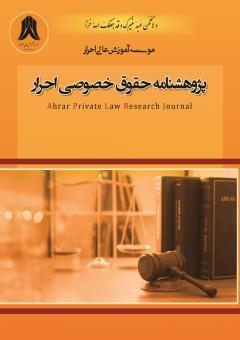Principle of Impartiality and Neutrality in the Exercise of Discretionary Powers in the Light of a Decision by the Administrative Court
Subject Areas : public lawSeyyed shahaboddin Musavizade merkie 1
1 - PhD in Public Law, Department of Public Law and Economic Law, Faculty of Law, Shahid Beheshti University, Tehran, Iran.
Keywords: Principle of Impartiality and Neutrality, Discretionary Power, Administrative Court, Selection, Legal Sociology.,
Abstract :
Discretionary power is a power granted by the legislator to public authorities with the aim of serving the public interest. This power is exercised in various areas, including the recruitment of volunteers in government agencies. According to the Universal Declaration of Human Rights, individuals have the right to equal access to public employment in their own country. According to the Law on the Administration of Public Services, the principle of meritocracy applies to entry into executive agencies. However, placing criteria such as religious beliefs in addition to acceptance in the entrance competition has a legal basis according to the Law on the Administration of Public Services. The question now is how can these two important issues (meritocracy and compliance with selection criteria) be achieved? This article attempts to answer this question by describing and analyzing a decision by an administrative court through a library study using data extraction tools. The results showed that compliance with the principles of impartiality and neutrality by executive agencies and supervision by administrative courts are good tools for achieving the legislative goal of granting discretionary powers to administrative authorities.
1. Imam Khomeini's Command on Selection (1982). . [In Persian]
2. Constitution of the Islamic Republic of Iran (1979, revised in 1989). . [In Persian]
3.Iranian Law on the Administration of Public Services (2007). . [In Persian]
4. Universal Declaration of Human Rights (1948).
5.Iranian Law on the Administrative Court (2013 with subsequent amendments). . [In Persian]
6.Iranian Law on the Selection of Education and Training Staff (1995). . [In Persian]
7.Iranian Law on the Extension of the Law on the Selection of Education and Training Staff to Employees of Other Ministries, Organizations, Institutions, and Government Companies (1996). . [In Persian]
8. Rasekh, M.(2011). Supervision and Balance in the System of Constitutional Law, 2nd ed., Tehran: Derak. . [In Persian]
9. Vizheh, M R.(2011). Theoretical Foundations and Structure of the Rule of Law (Advanced Course in Public Law 1), Tehran: Jangal. . [In Persian]
10. Hedayatvand, M, Mashhadi, A.(2010). Principles of Administrative Law in the Light of Decisions by the Administrative Court, Tehran: Kharazmi. . [In Persian]
11. Behnia, M, Zarei, M H. (2011). Reflections on the Possibility of Applying the Principle of Legitimate Expectation in the Administrative Court, Rahbord Journal, Vol. 20, No. 61, P. 153-189. . [In Persian]
12. Javad K and Hossein N. (2008). "Exercise of Discretionary Powers by Administrative Authorities, Legal Information Communication Journal, New Series, Vol. 6, No. 13, P. 7-21. . [In Persian]
13. Mashhadi, A. (2009).Criteria for Distinguishing the Powers of the Two Branches in the Jurisprudence of the Administrative Court", Legal Information Communication Journal, New Series, Vol. 6, No. 18-17, P. 19-31. . [In Persian]
14. Mashhadi, A. (2010).Justification and Critique of the Control of Executive Discretionary Powers, Journal of Information Communication of the Research and Information Organization of the Presidential Office, No. 19-20, P. 61-75. . [In Persian]
15. Vizheh, M R .(2009).The Principle of Legality in Administrative Action", Legal Teachings Journal, Islamic Azad University of Mashhad, No. 12, P. 85-113. . [In Persian]
16. Fanaazad, R.(2012).Discretionary Competence and the Rule of Law, PhD Thesis in Public Law, supervised by Mohammad Hossein Zarei, Shahid Beheshti University of Tehran, Faculty of Law. . [In Persian]
17. Karim Jozani, M.(2011). The Concept of Discretionary Powers and How to Control Them in Administrative Law, Master's Thesis in Public Law, supervised by Mohammad Jalali, Central Tehran Branch of Islamic Azad University, Faculty of Law and Political Science. . [In Persian]


